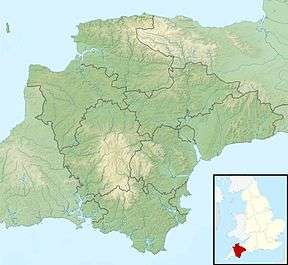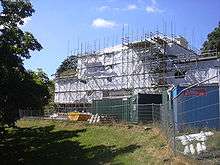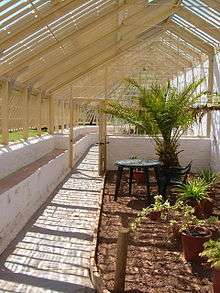Greenway Estate
| Greenway House | |
|---|---|
.jpg) | |
| Type | House |
| Location | Galmpton, Devon |
| Coordinates | 50°22′55″N 3°35′16″W / 50.381836°N 3.587771°WCoordinates: 50°22′55″N 3°35′16″W / 50.381836°N 3.587771°W |
| Built | c. 1780 |
| Architectural style(s) | Queen Anne |
| Governing body | National Trust for Places of Historic Interest or Natural Beauty |
Listed Building – Grade II | |
| Official name: Greenway | |
| Designated | 3 March 2004 |
| Reference no. | 1001686 |
 Location of Greenway House in Devon | |
Greenway, also known as Greenway House, is an estate on the River Dart near Galmpton in Devon, England. Once the home of the author Agatha Christie, it is now owned by the National Trust.
The estate is served by a steam railway service with trains from Paignton and Kingswear stopping at Greenway Halt station.
History
It was first mentioned in 1493 as "Greynway", the crossing point of the Dart to Dittisham. In the late 16th century a Tudor mansion called Greenway Court was built by the Gilbert family. Greenway was the birthplace of Humphrey Gilbert. His half-brother Sir Walter Raleigh also lived there and is said to have "frequently taken his ease on the Anchor Stone in the middle of the River Dart".[1] The present Georgian house was probably built in the late 18th century by Roope Harris Roope and extended by subsequent owners. The gardens may have been remodelled by landscape gardener Humphry Repton.
Greenway was bought by Agatha Christie and her husband Max Mallowan in 1938. The house was occupied by Christie and Mallowan until their deaths in 1976 and 1978 respectively, and featured, under various guises, in several of Christie's novels. Christie's daughter Rosalind Hicks and her husband Anthony lived in the house from 1968, until Rosalind's death in 2004.
The Greenway Estate was acquired by the National Trust in 2000.[2] Greenway House is a Grade II* listed building.[3] The Pevsner for Devon describes it as "tall, late-Georgian, stuccoed".[4] The gardens and parkland are Grade II listed in the National Register of Historic Parks and Gardens.[5] The house and gardens are open to the public, as is the Barn Gallery. The large riverside gardens contain plants from the southern hemisphere, whilst the Barn Gallery shows work by contemporary local artists.



Inspiration for Agatha Christie's works
Agatha Christie frequently used places familiar to her as settings for her plots. Greenway Estate and its surroundings in their entirety or in parts are described in the following novels:[6]
- The A.B.C. Murders (1936)
The character Sir Carmichael Clarke, a wealthy man from Churston, is one of three victims to have a copy of the A.B.C. Railway Guide left by his body. Churston is two miles from Greenway Estate and the station before Greenway Halt on the steam railway line. Within the plot, the 'C' of 'A.B.C.' refers to Churston as well as the character's name.
- Five Little Pigs (1942)
The main house, the footpath leading from the main house to the battery overlooking the river Dart and the battery itself (where the murder occurs) are described in detail since the movements of the novel's protagonist at these locations are integral to the plot and the denouement of the murderer.
- Towards Zero (1944)
The location of the estate opposite the village of Dittisham, divided from each other by the river Dart, plays an important part for the alibi and a nightly swim of one of the suspects.
- Dead Man's Folly (1956)
The boat house of Greenway Estate is described as the spot where the first victim is discovered, and the nearby ferry landing serves as the place where the second real murder victim is dragged into the water for death by drowning. Other places described are the greenhouse and the tennis court, where Mrs. Oliver placed real clues and red herrings for the "murder hunt". The lodge of Greenway Estate serves as the home of Amy Folliat, the former owner of Nasse House.
ITV's Agatha Christie's Poirot episode "Dead Man's Folly" was filmed there.[7]
References
- ↑ https://www.torbay.gov.uk/media/1838/libchurstonferrers.pdf
- ↑ Campbell, Sophie (24 February 2009). "Agatha Christie's home Greenway opens to the Devon public" – via www.telegraph.co.uk.
- ↑ "Greenway House, Kingswear – 1108548". Historic England.
- ↑ Pevsner & Cherry 1991, p. 525.
- ↑ Historic England. "Greenway (1001686)". National Heritage List for England. Retrieved 13 February 2016.
- ↑ John Curran: "Agatha Christie's Secret Notebooks - Fifty years of mystery in the making", Paperback edition, HarperCollinsPublishers 2010, ISBN 978-0-00-731057-9
- ↑ Eirik. "Investigating Agatha Christie's Poirot: Episode-by-episode: Dead Man's Folly". investigatingpoirot.blogspot.ch.
Sources
- Burdett, Sara (2010). Greenway. London: National Trust. ISBN 978-1-8435-9316-4.
- Cherry, Bridget; Pevsner, Nikolaus (1991). Devon. The Buildings of England. New Haven, CT and London: Yale University Press. ISBN 978-0-300-09596-8.
- Fido, Martin (1999). The World of Agatha Christie. Holbrook, MA: Adams Media. ISBN 978-1-5806-2160-1.
- "Greenway House, Kingswear – 1108548". Historic England. Retrieved 13 October 2018.
- Hack, Richard (2009). Duchess of Death. Beverley Hills, CA: Phoenix Books. ISBN 978-1-5977-7620-2.
- Hawthorne, Bret (2017). Agatha Christie's Devon. Wellington, Somerset: Halsgrove. ISBN 978-1-8411-4856-4.
- Macaskill, Hilary (2014). Agatha Christie at Home. London: Francis Lincoln. ISBN 978-0-7112-3563-2.
- Robyns, Gwen (1979). The Mystery of Agatha Christie. Harmondsworth, Middlesex: Penguin. ISBN 978-0-14-005228-2.
Further reading
- Greenway, Devon. London: National Trust, 2003; revised 2006, 24 pages. ISBN 978-1-84359-079-8
- Norway, Arthur Hamilton (1897) Highways and Byways in Devon and Cornwall. London: Macmillan; p. 100
- "National Trust - Greenway - History". www.nationaltrust.org.uk. Archived from the original on 2011-05-24. Retrieved 2008-02-04.
External links
| Wikimedia Commons has media related to Greenway Estate. |
- Greenway information at the National Trust
- Images of Greenway on the Official National Trust Print Website
- Video tour of Greenway from a BBC newscast